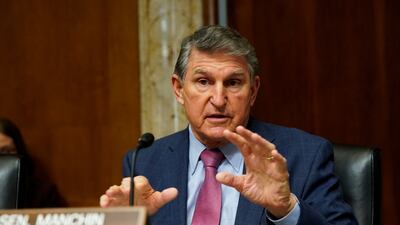Joe Manchin, a senator from deeply Republican and pro-coal West Virginia, has left the Democratic Party after years of opposition to its move towards a clean energy transition.
The long-time senator announced that he was changing his registration from Democrat to Independent, citing the “partisan extremism” plaguing the legislative branch.
“The brands have gotten so bad that if you have a D by your name, a Democrat, you're supposed to hate Republicans,” Mr Manchin said in a video statement.
“If you have an R by your name [Republican], you're supposed to hate Democrats. I don't hate either one and they're not our enemies.”
He had announced in November that he would not seek re-election to the Senate, a move that paved the way for Republicans to pick up a seat in their bid to retake the majority next year.
Mr Manchin was a rare parliamentarian to consistently cross party lines on Capitol Hill, elevating his importance in a Senate with razor-thin margins of control.
The West Virginian, who heads the Energy and Natural Resources Committee, has faced increasing pressure – and at times direct confrontation – from progressives over his track record of protecting the fossil fuel industry and blocking “green” policies in Congress.
According to Open Secrets, he is among the top recipients of donations from the oil and gas industry, totalling $1,238,116 in contributions.
His hard-won support of the landmark Inflation Reduction Act (IRA) ultimately allowed for the success of the bill aimed at tackling the climate crisis, after he derailed the political process on an earlier version.
The IRA was celebrated as “the biggest investment to combat climate change ever”, aiming to reduce carbon emissions by about 40 per cent by 2030 – though Mr Manchin's demands contributed to it packing a softer punch.
It had “some big fossil fuel wins, such as mandating some oil and natural gas lease sales, and in combination with the bipartisan infrastructure law, Manchin secured major programmes to boost hydrogen energy”, according to analysis from Environment and Energy Publishing.
Mr Manchin was also able to get President Joe Biden and other Democrats to promise him support for easing environmental regulations on energy permits.
He has been among the Biden administration's harshest critics over its ambitious climate agenda and implementation of the IRA.
This month, he joined Republicans in the Senate to introduce legislation disapproving of recent electric and clean vehicle credit rules.
“The Inflation Reduction Act was written specifically to bring our energy and manufacturing supply chains back to the United States and eliminate our dependency on foreign adversaries, especially China,” Mr Manchin said in a statement last week.
“This administration continues to ignore the law that Congress agreed upon and implement a bill that they did not pass that allows China to gain control of our nation’s auto industry.”
Progressive Democrats critical of Mr Manchin had foreshadowed his transition away from the party:
Representative Alexandria Ocasio Cortez told New York Magazine in 2022 that US “politics has fundamentally changed – whether it’s for better or for worse is for people’s determination – but I was never under the illusion that we can bring Manchin along”.
Mr Manchin's political future currently remains unclear, as he did not indicate if he plans to run for office again, after denying rumours in February that he would run as a third-party presidential candidate against Mr Biden.


